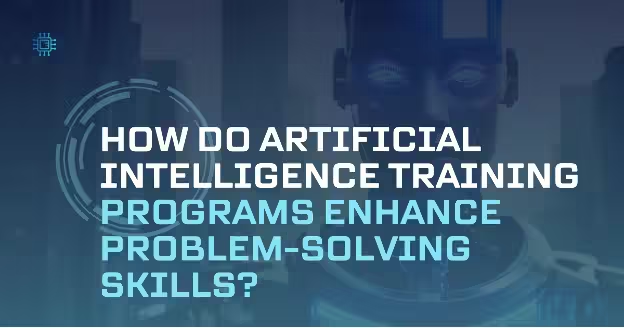How Do Artificial Intelligence Training Programs Enhance Problem-Solving Skills?

Artificial Intelligence (AI) is revolutionizing the way we approach complex challenges. From automating mundane tasks to solving some of the most intricate global issues, AI has become a critical component across industries. However, AI doesn’t only enhance machine efficiency it also plays a significant role in refining human cognitive abilities, especially problem-solving skills. But how exactly do Artificial Intelligence training programs contribute to this enhancement? Let’s explore how AI courses, structured training, and real-world applications boost problem-solving abilities.
What Are Artificial Intelligence Training Programs?
Artificial Intelligence training programs are structured educational courses designed to equip individuals with the knowledge and skills needed to work with AI technologies. These programs cover a wide array of topics, such as machine learning, natural language processing (NLP), robotics, computer vision, and AI ethics.
AI training can range from introductory courses for beginners to more advanced programs that prepare professionals for AI-driven careers. These programs typically focus on both theoretical foundations and practical applications, allowing learners to not only understand AI models and algorithms but also implement them effectively. The goal is to create proficient individuals who can navigate AI tools and contribute to solving real-world problems using AI.
The Diverse Types of AI Training Programs
AI training is offered in various formats, including:
- Online courses (e.g., Coursera, Udemy, edX)
- Workshops and bootcamps designed for intensive learning
- University degree programs focused on AI, machine learning, and data science
- Corporate training aimed at upskilling professionals already working in tech fields.
How Do AI Training Programs Foster Analytical Thinking?
At the core of AI is data; the more data an AI system has, the more accurate and reliable its predictions or outputs will be. AI training programs immerse learners in real-world datasets, teaching them how to analyze and interpret data to solve specific problems. This hands-on experience fosters critical analytical thinking by encouraging learners to engage with complex data, spot patterns, and evaluate data quality.
Through exercises involving supervised and unsupervised learning models, learners develop a keen understanding of how data can be transformed into actionable insights. These skills extend beyond the AI field and can be applied to various problem-solving contexts in other industries, such as finance, healthcare, and marketing.
In What Ways Do AI Simulations Enhance Problem-Solving Skills?
One of the most valuable features of AI training is the use of simulations. These simulations provide a safe, risk-free environment where learners can experiment with different algorithms, test various solutions, and see the immediate effects of their actions. This approach mimics real-world problem-solving processes, where trial and error often lead to improved solutions.
For example, in machine learning, learners might run simulations using different types of models (e.g., decision trees, neural networks, or support vector machines) to solve classification problems. These exercises allow learners to assess the effectiveness of each model, adjust parameters, and iterate on their strategies until they achieve optimal performance. The iterative nature of these simulations develops a problem-solving mindset where learners learn to embrace failure as a step toward discovering the most effective solutions.
How Does Learning AI Promote Cognitive Flexibility?
AI training programs encourage cognitive flexibility by presenting problems that have multiple potential solutions. This is especially true in the context of machine learning and deep learning, where choosing the right algorithm, adjusting its parameters, or fine-tuning it through hyperparameter optimization can lead to different outcomes.
In AI courses, learners are encouraged to experiment with multiple approaches to solving a given problem, which allows them to develop flexibility in their thinking. For example, when working on a classification task, learners may try different feature engineering techniques or test various models to determine which one performs best. This flexibility in thinking is vital not only in AI but in tackling diverse problems in any professional or personal context.
How Do AI Training Programs Encourage Ethical Problem-Solving?
In AI development, ethics plays a crucial role, as decisions made by AI systems can have far-reaching consequences for individuals and societies. AI training programs emphasize the importance of ethical considerations, teaching learners to approach problem-solving with a mindset that values fairness, transparency, and accountability.
A key aspect of ethical problem-solving in AI involves understanding and mitigating biases that may be present in training data. For example, AI models used in recruitment or lending decisions might inadvertently favor one demographic over another if the training data is biased. AI courses that integrate ethics into their curriculum help learners identify these biases and develop methods to reduce or eliminate them. This ensures that AI solutions are equitable and serve society’s best interests.
Ethical problem-solving also involves considering the potential impact of AI systems on various stakeholders, including underrepresented groups. By instilling ethical thinking in AI practitioners, training programs contribute to creating AI technologies that promote inclusivity and fairness.
How To Learn Artificial Intelligence Training?
Learning Artificial Intelligence (AI) can be a game-changer for your career, and with Tecknologia, it’s easier than ever to get started. Tecknologia is an online platform offering expert-led AI training that you can access from the comfort of your home. Their courses are designed to make complex AI concepts easy to understand, whether you’re a beginner or looking to level up your skills. With a strong focus on real-world projects, hands-on practice, and personalized guidance from experienced instructors, you’ll gain practical knowledge that sets you apart.
From machine learning and deep learning to natural language processing, Tecknologia covers all the essential areas of AI. Plus, they offer a wide range of other online courses to expand your skills in tech and business. Whether you’re learning AI to advance your career or explore a new passion, Tecknologia provides flexible, high-quality training that helps you stay ahead in this fast-moving field.
Conclusion:
Artificial Intelligence training programs do far more than teach technical skills—they cultivate a powerful, adaptive problem-solving mindset. By combining theoretical knowledge with hands-on experiences, simulations, and ethical reflection, these programs empower learners to tackle real-world challenges with creativity, critical thinking, and responsibility. Whether it’s analyzing complex datasets, experimenting with algorithms, or making ethically sound decisions, AI training helps individuals develop the cognitive agility and analytical precision necessary in today’s rapidly evolving world. Platforms like Tecknologia make this learning accessible and effective, opening the door to transformative growth for both individuals and the industries they serve. As AI continues to shape our future, investing in high-quality training isn’t just smart—it’s essential.
![]()






